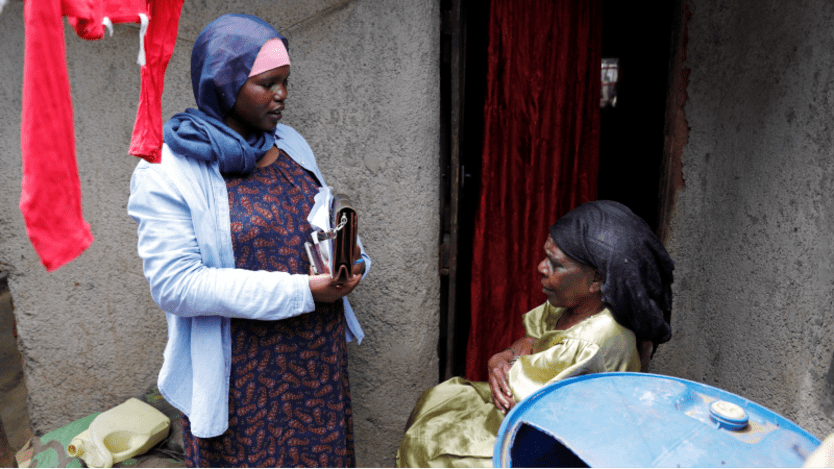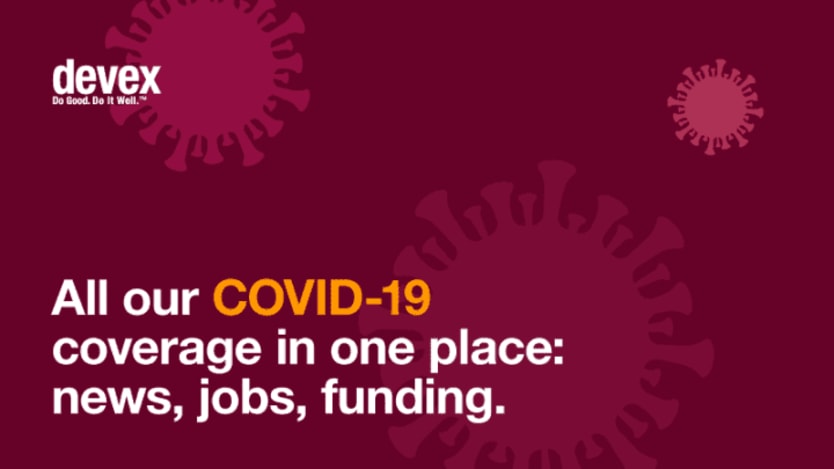
LONDON — What do bleeding gums, the heart, and social distancing have in common? Aside from their medical implications, they are all challenging key phrases to translate, highlighting a “blind spot” in emergency responses, experts told Devex.
As fears mount over the potential impact of the COVID-19 pandemic on low-income countries, health agencies have been ramping up communications to warn people of the virus and how to stay safe.
“In any emergency there is a need [for translation] and it's a blind spot in responses — thinking everyone speaks English or an international language there anyway.”
— Ellie Kemp, head of crisis response, Translators without BordersA critical aspect of this is translating potentially lifesaving health information into languages around the world. But jargon terms — some of which were largely unknown outside the medical community until a few weeks ago — complicate those efforts and can hinder health responses.
For all the latest news, jobs, funding opportunities — including remote work and social distancing resources.
The difficulties encountered in translation also highlight the need for health information to be accessible and relevant to low-income communities, experts said.
A small community of specialists, building on their experience during the Ebola crisis, has been working to ensure people from vulnerable communities are able to understand the information about COVID-19 produced by international agencies such as the World Health Organization.
“Technical terms like ‘social distancing’ can be unhelpful because they are unfamiliar, so most people won’t immediately understand their meaning,” explained Ellie Kemp, head of crisis response at Translators without Borders, which is working to translate public health material for COVID-19.
If reference materials aren’t provided in a given language, translators will often resort to a literal translation, which won’t mean much, she added. “So finding alternatives that do speak to the concept and will be widely understood is crucial. Ideas like 'keeping a protective distance from other people' may be more accurately relayed."
Paul Warambo, Kenya manager for TWB, added: “In African languages, that social distance concept in itself is non-existent. Translators have struggled with translating it into Swahili and Luo for some of our COVID materials we have [dealt] with so far. There is a general agreement to adapt it to something like ... ‘keeping away from people.’”
Although new phrases may arise with each emergency, the challenge isn’t unique to the current pandemic. “This is an issue across every humanitarian response,” Kemp said. “In any emergency there is a need [for translation] and it's a blind spot in responses — thinking everyone speaks English or an international language there anyway.”
She added: “The people it leaves out are the people without an education: women, people with disabilities, the elderly … the most vulnerable.”
The languages spoken in areas with infections, or that are expected to be affected, must be mapped out. In many vulnerable communities, understanding of health or biological concepts is poor, and this can be reflected in the language spoken.
“Often there are no equivalent terms for ‘virus’, ‘disease’ or, ‘transmission’ in the different languages we are working in,” said Emebet Wuhib-Mutungi, senior health adviser at BBC Media Action, which along with TWB has received funding from the United Kingdom to combat COVID-19 misinformation.
She continued: “It’s critical to do rapid audience research at the outset to get to know people’s understanding of these terms, and then to work with linguistics and production teams from that country and context, and to pretest content before using it more widely.”
For example, through focus groups, Wuhib-Mutungi’s team found that refugee Rohingya communities in Bangladesh used the same word — “fuk” — to mean insect, virus, germs, and bacteria. The Rohingya word “hoilla,” meaning the liver, was used frequently to describe the heart.
While aid workers often communicate in acronyms and jargon, translation of health communications must be done in the simplest way possible, “using the words that anybody would understand,” Kemp said.
Part of that is using local knowledge to ensure important messages are understood. During the Ebola response in the Democratic Republic of the Congo, aid workers asked a local health communicator how best to describe “contact tracing.” The reply was a Swahili phrase that literally meant “monitoring all the people who've been close to a sick person,” Kemp said.
More on translating development:
► The child translators on the frontline of Europe’s migrant crisis
► 700 words and expressions to help aid workers communicate with Rohingya refugees
Also in DRC — where the last patient suffering from Ebola was recently discharged — posters identifying symptoms such as “bleeding gums” were displayed in Congolese Swahili as “nyama za mumeno,” according to Kemp. But focus groups revealed the only translation that was universally understood by the target demographic was “bihanga,” a word from another local language, Hunde.
Native-speaking staff also instinctively soften “violent brutal language” which might cause people to ignore advice. “You're talking about life and death, you've got to do it in a way that's respectful to people,” Kemp said. Words such as “suspected case” also have overtones of criminality. “No one wants to be labeled like that,” she added.
Inconsistent translations can lead to a poorer understanding of health advice, so TWB is currently building a glossary to standardize key words across dialects.
Explaining to people why they should listen to advice, especially if it has changed, is also crucial for effective communication. “Often the messages only focus on what people should or should not do, without providing a space for people to engage in discussion around the ‘how’ and the ‘why,’” Wuhib-Mutungi said.
She continued: “Knowing that washing your hands with soap can prevent diarrhea is very different from knowing [the longer process of] how to wash your hands to help prevent COVID-19 transmission … and why this is important.”
Even if health advice is perfectly translated, they must also consider the circumstances of the people receiving the advice, several experts told Devex. It should be adapted to how people live or run the risk of it being ignored altogether.
“Many organizations are promoting concepts that are alien to our audiences, no matter how they are described,” Wuhib-Mutungi said. “Social distancing and self-isolation present particular problems if you live in a two-room house with 10 others, and then even more so if that house is in a slum with thousands of other people. Another issue is advice around hand-washing, if people don’t have access to enough water or don’t have the money for soap or hand sanitizer.”
Mukesh Kapila, professor of global health and humanitarian affairs at the University of Manchester, echoed this sentiment. “It is particularly frustrating for poorer countries to be prescribed things they must do when we know that they don't have the means to do them,” he said.
“When less than 20% of households in Africa have regular access to soap and may also need to spend up to a fifth of their income on water, telling them to handwash is [the] equivalent of Marie Antoinette telling the hungry Parisians to eat cake.”

Search for articles
Most Read
- 1
- 2
- 3
- 4
- 5








